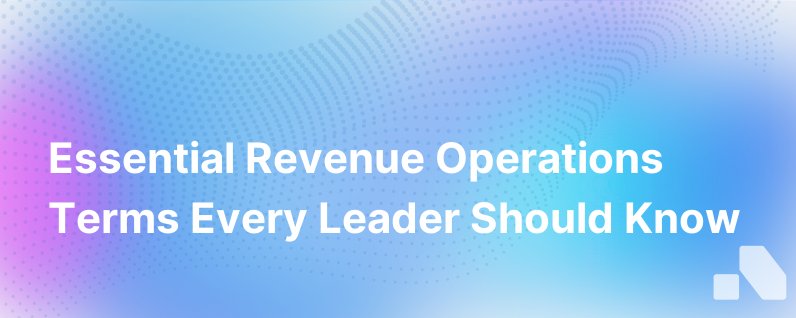
In the complex landscape of Revenue Operations (RevOps), being well-versed in the language of the field is crucial for any business looking to streamline its operations and scale effectively. For businesses that understand and adopt RevOps, the integration of sales, marketing, and customer service processes translates to more aligned goals, improved efficiency, and, ultimately, increased revenue. At the core of this integration is a comprehensive glossary of RevOps terms that professionals should master.
To aid in the understanding and application of these sometimes opaque concepts, we present the fourth installment of our Revenue Operations Glossary series. Let’s dive into the terminology that will help you navigate the intricacies of RevOps and empower your teams for synergistic success.
Customer Lifetime Value (CLTV)
Customer Lifetime Value represents the total revenue a business can reasonably expect from a single customer account throughout the business relationship. This metric is foundational in making informed decisions about sales, marketing, product development, and customer support.
Customer Acquisition Cost (CAC)
Customer Acquisition Cost is the total average expense incurred by a business in convincing a potential customer to buy a product or service. This can include marketing, advertising expenses, and the salaries of sales teams. Both CAC and CLTV are instrumental in measuring the return on investment for acquiring new customers.
Churn Rate
Churn Rate is the percentage of customers that a company loses over a given period. It is a vital health indicator for subscription-based businesses or those that rely on customer retention for revenue. Keeping the churn rate to a minimum is essential for sustainable business growth.
Sales Velocity
Sales Velocity is a measure of how quickly deals move through your pipeline and generate revenue. It is calculated by multiplying the number of opportunities by the average deal value and the win rate, then dividing by the length of the sales cycle. Accelerating sales velocity can significantly increase revenue.
Account-Based Marketing (ABM)
Account-Based Marketing is a strategic approach where marketing resources target a defined set of key accounts rather than the traditional broad-based marketing strategy. ABM tailors campaigns to engage each account, reflecting the personalized communication they receive from the sales team.
Annual Recurring Revenue (ARR)
Annual Recurring Revenue is the predictable revenue a business can expect to receive from its customers annually for providing its products or services. ARR is particularly relevant for companies with a subscription-based pricing model.
Monthly Recurring Revenue (MRR)
Monthly Recurring Revenue is similar to ARR but calculated on a monthly basis. This metric is essential for tracking the monthly financial health of subscription-based companies.
Lead Qualification
Lead Qualification refers to the process of determining whether a potential customer meets the established criteria to become a prospect. Qualification frameworks include BANT (Budget, Authority, Need, Timing) and CHAMP (Challenges, Authority, Money, Prioritization).
Sales Enablement
Sales Enablement encompasses the processes, content, and technology that empower sales teams to sell more effectively. The goal of sales enablement is to provide salespeople with what they need to successfully engage the buyer throughout the buying process.
Sales Engagement Platforms
Sales Engagement Platforms are systems that streamline the sales process through automated workflows, integrated communication tools, and actionable analytics. They are designed to facilitate more effective engagement between sales teams and prospects.
Marketing Qualified Lead (MQL)
Marketing Qualified Lead is a lead judged more likely to become a customer compared to other leads based on lead intelligence, often informed by closed-loop analytics.
Sales Qualified Lead (SQL)
Sales Qualified Lead is a prospective customer that has been vetted by both marketing and sales teams and is deemed ready for the next stage in the sales process.
Go-To-Market Strategy (GTM)
The Go-To-Market strategy is an action plan that outlines how to deliver a unique value proposition to customers and achieve competitive advantage. The purpose of a GTM strategy is to provide a blueprint for delivering a product or service to the end customer, taking into consideration the marketing and sales channels and the customer journey.
Forecasting
Forecasting in RevOps refers to using historical data and analysis to make educated predictions about future sales and revenue performance. This is critical for budgeting, resource allocation, and strategic planning.
Pipeline Management
Pipeline Management involves actively monitoring and managing every stage of the sales pipeline to optimize the flow of potential sales. The goal is to ensure that the pipeline remains full of qualified leads to avoid sales droughts.
Win Rate
The Win Rate is the percentage of deals closed successfully compared to the total number of deals in the pipeline. It serves as a crucial indicator of sales effectiveness and efficiency.
In the data-driven universe of Revenue Operations, familiarity with these terms is more than lexical expertise. It amounts to a strategic asset in the drive for operational optimization and revenue growth. After all, these concepts encapsulate the very metrics and methodologies that steer organizations toward cohesive and profitable operations.
Understanding and leveraging these RevOps terms can enable teams to align their goals, streamline processes, and communicate more effectively. Implemented correctly, RevOps can eradicate siloes and establish a shared language and objectives across all revenue-generating business units, fostering an environment where sustainable growth is not just an objective but an ongoing achievement.
In a landscape punctuated by rapidly evolving technology platforms and methodologies, such as those offered by Aomni, cultivating a deep understanding of RevOps lexicon and best practices remains pivotal to pioneering new frontiers in sales efficiency and customer satisfaction.